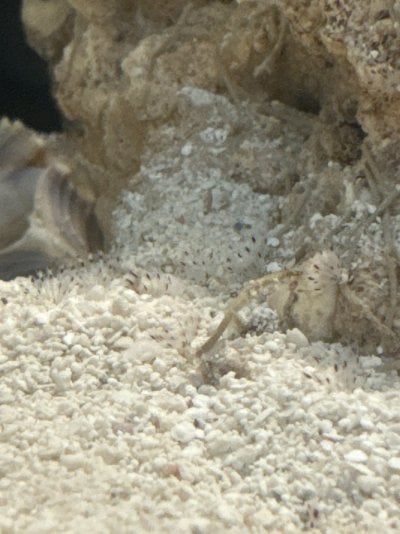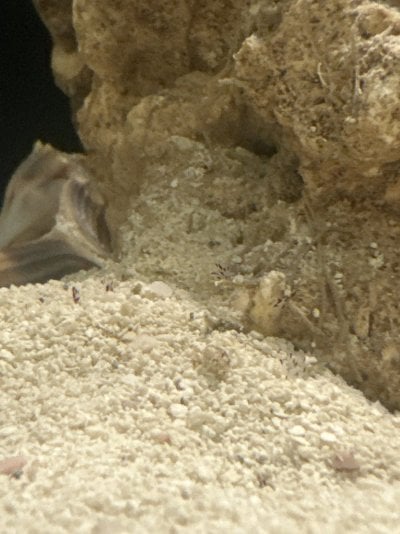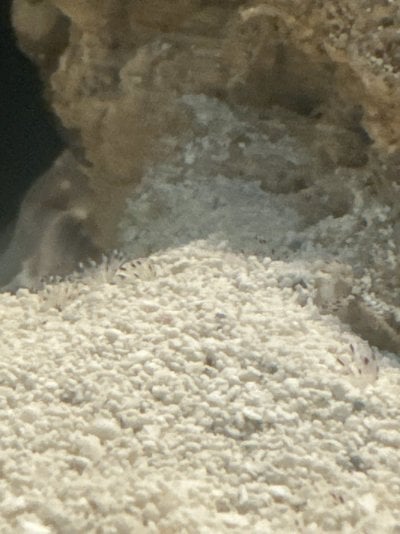I have a little colony of tiny feather dusters; they have been doing great the past few weeks they were open 24/7. Earlier this week one of their tubes completely disappeared and I found it across the tank, the duster was still there though and was feeding and everything, but this morning it was completely gone (tube and worm). I don't know how it moved in the first place because they have to leave the tube to move. The rest of the worms remain either half closed or completely closed. WHAT IS GOING ON??
Navigation
Install the app
How to install the app on iOS
Follow along with the video below to see how to install our site as a web app on your home screen.
Note: This feature may not be available in some browsers.
More options
You are using an out of date browser. It may not display this or other websites correctly.
You should upgrade or use an alternative browser.
You should upgrade or use an alternative browser.
Feather Dusters acting weird
- Thread starter BristleWormHater
- Start date
- Tagged users None
I thought I would throw this in to help, heres the notable water parameters.
Ammonia 0
Nitrite 0
Nitrates 40 <- Is this the problem?
Ammonia 0
Nitrite 0
Nitrates 40 <- Is this the problem?
Typically when feather dusters are stressed, they'll drop their crowns, not move their tubes. Is there anything that could attacking the tubes or that could be breaking the tubes off?
Not to my knowledge, the only things I know are in the tank are amphipods, micro brittle stars, parchment worms, and the feather dusters. The feather dusters are really close to each other, is that the problem?Typically when feather dusters are stressed, they'll drop their crowns, not move their tubes. Is there anything that could attacking the tubes or that could be breaking the tubes off?
There's a asterina starfish in there tooNot to my knowledge, the only things I know are in the tank are amphipods, micro brittle stars, parchment worms, and the feather dusters. The feather dusters are really close to each other, is that the problem?
That's really unlikely to be the problem. I'd personally check at night for predators and double check things like the flow they're getting, what they're being fed, etc.Not to my knowledge, the only things I know are in the tank are amphipods, micro brittle stars, parchment worms, and the feather dusters. The feather dusters are really close to each other, is that the problem?
Hopefully those with hands-on experience will comment for you here though.
Forgot to mention all of them open up when I dose phyto, but other than that they close up or stay open a little, but they used to stay out all the time.Typically when feather dusters are stressed, they'll drop their crowns, not move their tubes. Is there anything that could attacking the tubes or that could be breaking the tubes off?
@ISpeakForTheSeas What predators should I be looking for?
Update: I did a water change they seem happy now

Not sure - just the tube popping out of place is odd.@ISpeakForTheSeas What predators should I be looking for?
Hope they're still doing better!
Strange name you have, since feather dusters are bristle worms!I have a little colony of tiny feather dusters; they have been doing great the past few weeks they were open 24/7. Earlier this week one of their tubes completely disappeared and I found it across the tank, the duster was still there though and was feeding and everything, but this morning it was completely gone (tube and worm). I don't know how it moved in the first place because they have to leave the tube to move. The rest of the worms remain either half closed or completely closed. WHAT IS GOING ON??
Thats not how taxonomy works. They are both in the class polychaete, but they are not the same order, family, genus, or species. Bristleworms are in the order Amphinomida, feather dusters are in the order Sabellida. It's like saying a lion and a house cat are the same thing because they are both felines.Strange name you have, since feather dusters are bristle worms!
Nice try though
Strange name you have, since feather dusters are bristle worms!
Haha, it's mostly semantics for hobby purposes; technically speaking, any Polychaete is a bristleworm, including feather dusters (poly meaning "many," and chaete referring to the chitinous setae - the bristles - of the worms; so a polychaete is a worm with many chitinous bristles, hence the name "bristleworm").Thats not how taxonomy works. They are both in the class polychaete, but they are not the same order, family, genus, or species. Bristleworms are in the order Amphinomida, feather dusters are in the order Sabellida. It's like saying a lion and a house cat are the same thing because they are both felines.
Nice try though
From a hobbyist perspective, however, the distinction is easily made, and - with feather dusters being prettier and less likely to poke you with a bristle - they're generally considered desirable while other bristle worms are considered questionably acceptable.
Worms from the order Amphinomida are bristleworms, but more specifically they're considered fireworms (though I can't find any evidence on the toxicity of Euphrosinid worms to validate using that name for them; it does apply to Amphinomid worms for sure though).
So, to stick with the house cat and lion example, both are technically cats, but they're different kinds of cats - it's the same with fireworms and feather dusters; they're both polychaetes/bristleworms, but they're very different kinds.
Similar threads
- Replies
- 2
- Views
- 91
- Replies
- 2
- Views
- 98
- Replies
- 2
- Views
- 329
- Replies
- 52
- Views
- 1,412























